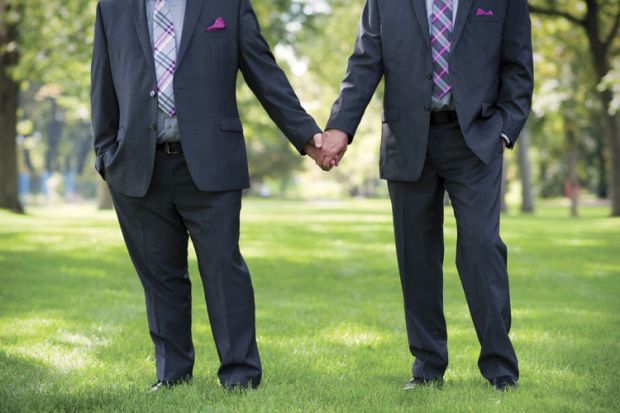It is “right that higher education institutions should host and nurture opinions not at the time fashionable in wider society, and…protect those who wish to express unpopular views”. So says Ferdinand von Prondzynski, vice-chancellor of Robert Gordon University in Aberdeen, writing on his University Blog after the referendum in the Republic of Ireland on whether same-sex couples should be allowed to marry.
The “yes” vote carried the day, as had been widely predicted, but thinking back to his student days at Trinity College Dublin in the 1970s, Professor von Prondzynski recalls a different attitude among his fellow undergraduates. “Such a profound change would have seemed a very long way off, if indeed it seemed achievable in any timescale at all,” he writes, describing Trinity as “probably the main hotbed for the emerging issue”.
“One of its academic staff was David Norris, one of the few people at the time to have been brave enough to declare themselves gay and to bring the issue to the public’s attention,” he recalls. “Back then the public was probably overwhelmingly hostile, but inside TCD David Norris was given the opportunity to make his case and to do so publicly.”
Professor von Prondzynski cautions that it “should not be thought that universities are dedicated exclusively to progressive liberal values, nor should it be assumed that every novel idea championed by an academic should one day reflect the outlook of our national community”.
But he continues: “In this case the big and welcome change last week carried through by Irish voters was made possible by the courage and persistence of academics, and by the university culture that gave them space to play their role,” he concludes.
Same-sex marriage was also discussed this week on Retraction Watch, albeit in a very different context.
A post on the blog, which highlights cases in which academic journal publishers have removed or changed their content, details a scholar’s request that his study of “changing minds on same-sex marriage” be retracted after data used in the research were alleged to be unreliable.
Donald Green, professor of political science at Columbia University, and Michael LaCour, a graduate student at the University of California, Los Angeles, published the paper “When contact changes minds: An experiment on transmission of support for gay equality” in the journal Science in December 2014.
However, when two graduate students at the University of California, Berkeley planned an extension of the work, they found that the response rate of the pilot study was “notably lower” than had been reported. The survey firm the two students thought had performed the first study said that it had “no familiarity with the project”.
In a statement published on the blog, Mr LaCour says he stands by the study’s findings, and he is preparing a “definitive response”.
Science published an “editorial expression of concern” on its site, which states: “On 19 May 2015, author Green requested that Science retract the paper because of the unavailability of raw data and other irregularities that have emerged in the published paper.”
Chris Parr
Send links to topical, insightful and quirky online comment by and about academics to chris.parr@tesglobal.com
后记
Article originally published as: THE Scholarly Web (4 June 2015)
